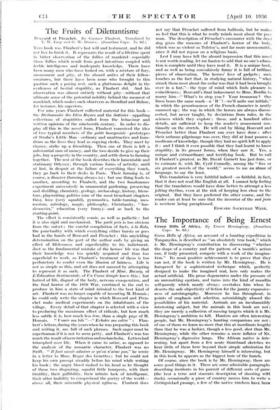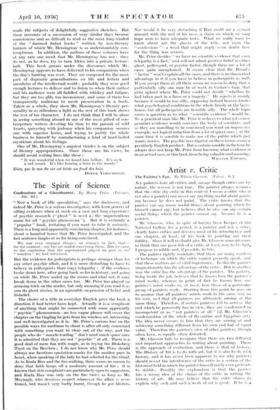The Importance of Being Ernest
Green Hills of Africa, an account of a hunting expedition in Tanganyika, is described as ""an absolutely true book," which is Mr. Hemingway's contribution to 'discovering "whether the shape of a country and the pattern of a month's action can, if truly presented, compete with a work of the imagina- tion." Its most positive achievement is to prove that they can not, if the book is written by Mr. Hemingway. He is hampered by a sophisticated technique which, perfectly designed to make the imagined real, here only makes the actual artificial. His prose degenerates under the pressure of an unremitting egotism, and turns into the kind of maudlin self-parody which nearly always overtakes him when he deserts the safe objectivity of fiction for the jaunty expansive- ness of autobiography. Moreover he has throughout, in points of emphasis and selection, astonishingly abused the possibilities of his material. Animals are an inexhaustibly interesting subject, but the animals in this 'book are not ; they are merely a collection of moving targets which it is Mr. Hemingway's ambition to kill. Hunters are often interesting people, but Mr. Hemingway's hunting companions are not ; of one of them we learn no more (but this at inordinate length) than that he was a luckier, though a less good, shot than Mr. Hemingway, while the other remains a mere inflator of Mr. Hemingway's digressive lungs. The African native is inte- resting, but apart from a few acute thumbnail sketches we hear little of them here beyond their simple admiration fbr ,Mr. Hemingway. Mr. Hemingway himself is interesting, but in this book he appears as the biggest bore Of the bunch.
Of course, since the book is by Mr. Hemingway, there are some good things in it. There are some admirable paragraphs describing incidents in his pursuit of different sorts of game (the best a terse and staccato description of shooting wild duck), occasionally a piece of country moves him to write' a dis' tinguisled passage; a few of the native trackers have been made the subjects of delightfully suggestive sketches. But these accounts of a succession of very similar days became monotonous and as difficult to read as the most long-winded of the "damned Safari books" written by non-literary hunters of which Mr. Hemingway is so understandably con- temptuous. In addition, the authors of these volumes have at any rate one merit that Mr. Hemingway has not : they do not, As he does, try to turn Africa into a private lecture- hall. This book groans under the discourses which Mr. Hemingway appears to have delivered to his companions when the day's hunting was over. They are composed for the most part of dogmatic generalisations on life and letters and anecdotes of the intellectual world ; probably they were good enough lectures to deliver and to listen to when their author and his audience were all fuddled with whiskey and fatigue, but they are too glib, too inconsistent, and some of them too transparently malicious to merit preservation in a book. Taken as a whole, they show Mr. Hemingway's literary per- sonality in as ridiculous a light as the rest of this book shows the rest of his character. I do not think that I will be alone .itt,seeing something absurd in one of the most gifted of con- temporary writers devoting his time to the pursuit of wild beasts, quivering with jealousy when his companion secures one with superior horns, and trying to justify the whole business to himself by manufacturing a kind of hard-boiled mysticism about his feelings.
. One of Mr. Heming,way's angriest tirades is on the subject of literary appropriations. Since those are his views, he should avoid writing lines like these : "It was wonderful when we heard him bellow. It's such a sad sound. It's like hearing a horn in the woods."
Dieu, que le son du cor est triste au fond des bois.











































 Previous page
Previous page